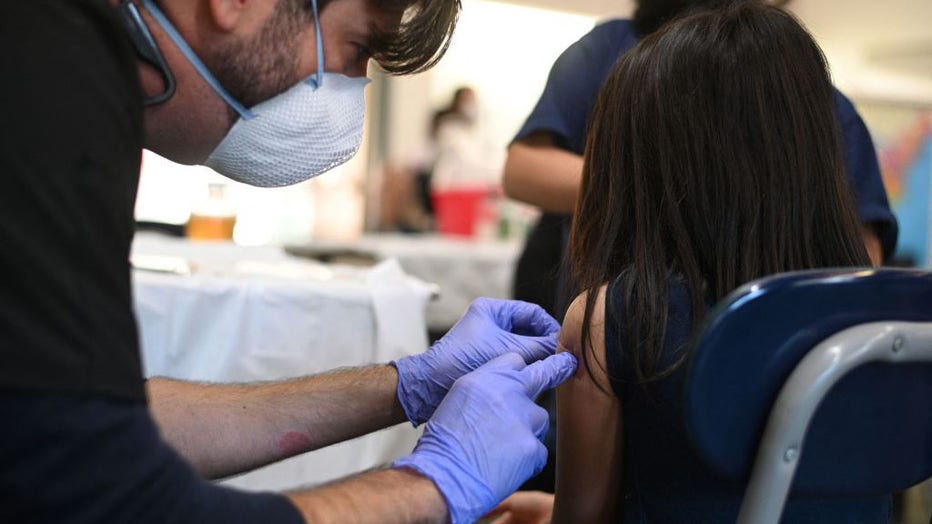CDC expands COVID-19 booster recommendation to include kids 5 to 11
The U.S. Center for Disease Control and Prevention quickly adopted the recommendation to expand COVID-19 booster doses to healthy elementary-age kids — just like what is already recommended for everybody 12 and older.
"CDC now recommends that children ages 5 through 11 years should receive a booster shot 5 months after their initial Pfizer-BioNTech vaccination series," according to an agency statement.
The Advisory Committee on Immunization Practices (ACIP), an influential advisory panel to the CDC, approved a motion to recommend the expansion after a meeting on Thursday.
The hope is that an extra shot will shore up protection for kids as infections once again are on the rise.
"Vaccination with a primary series among this age group has lagged behind other age groups leaving them vulnerable to serious illness," said CDC Director Dr. Rochelle Walensky, in a statement.
"We know that these vaccines are safe, and we must continue to increase the number of children who are protected," she said.
Eleven panelists voted yes, one voted no and another declined to vote during Thursday’s vote.
"A single Pfizer-BioNTech COVID-19 vaccine booster dose is recommended for persons ages 5-11 at least 5 months after the primary series, under the FDA’s Emergency Use Authorization," according to the interim recommendation read during the panel meeting.
Earlier this week, the U.S. Food and Drug Administration authorized the booster doses, made by Pfizer-BioNTech, for healthy, elementary-age kids. The extra shots are recommended at least five months after a child’s last vaccine dose.
The extra vaccine dose comes as COVID-19 infections once again creep upward in the U.S.
Everyone 12 and older is already urged to get a booster dose for the best protection against the newest coronavirus variants — and some people, including those 50 and older, can choose a second booster.
Pfizer-BioNTech makes the only COVID-19 vaccine available for children of any age in the U.S., and kids ages 5 to 11 receive just one-third of the dose given to everyone 12 and older.

FILE IMAGE - A registered nurse puts a bandaid on a girl's arm after administering a pediatric dose of the COVID-19 vaccine at an L.A. Care Health Plan vaccination clinic at Los Angeles Mission College in the Sylmar neighborhood in Los Angeles, Calif
Whether elementary-age children need a booster has been overshadowed by parents’ outcry to vaccinate even younger tots, those under 5 — the only group not yet eligible in the U.S. Both Pfizer and rival Moderna have been studying their shots in the youngest children, and the FDA is expected to evaluate data from one or both companies sometime next month.
For the 5- to 11-year-olds, it's not clear how much demand there will be for boosters. Only about 30% of that age group have had the initial two Pfizer doses since vaccinations opened to them in November, according to data shared by the CDC.
But Pfizer’s vaccine "is effective in helping to prevent the most severe consequences of COVID-19 in individuals 5 years of age and older," said FDA vaccine chief Dr. Peter Marks. "A booster dose can help provide continued protection against COVID-19 in this and older age groups."
In a small study, Pfizer found a booster revved up those kids’ levels of virus-fighting antibodies — including those able to fight the super-contagious omicron variant — the same kind of jump adults get from an extra shot.
While the coronavirus is more dangerous to adults than to children, youngsters can get severely ill — and more than 350 children ages 5 to 11 have died, according to CDC’s count.
Adding to public confusion, the CDC estimates that 3 out of every 4 U.S. children of all ages have been infected with the coronavirus since the pandemic’s start — many of them during the winter omicron wave. Still, health authorities urge vaccination even in people who’ve previously had COVID-19, to strengthen their protection.
RELATED: Why are vaccines still important if so many kids have already had COVID-19?
With subtypes of omicron now spreading, the U.S. is averaging about 91,000 cases reported a day, compared to about 57,000 just two weeks ago. That's a small fraction of the infections seen during the brutal winter surge — but experts also say it's a vast undercount as testing has dropped and at-home tests often aren't reported.
Vaccination may not always prevent milder infections, especially as omicron and its siblings are better than some prior variants at slipping past those defenses. But health authorities agree that vaccinations continue to offer strong protection against the worst outcomes of COVID-19, including hospitalization and death.
This story was reported from Cincinnati. The Associated Press contributed.

